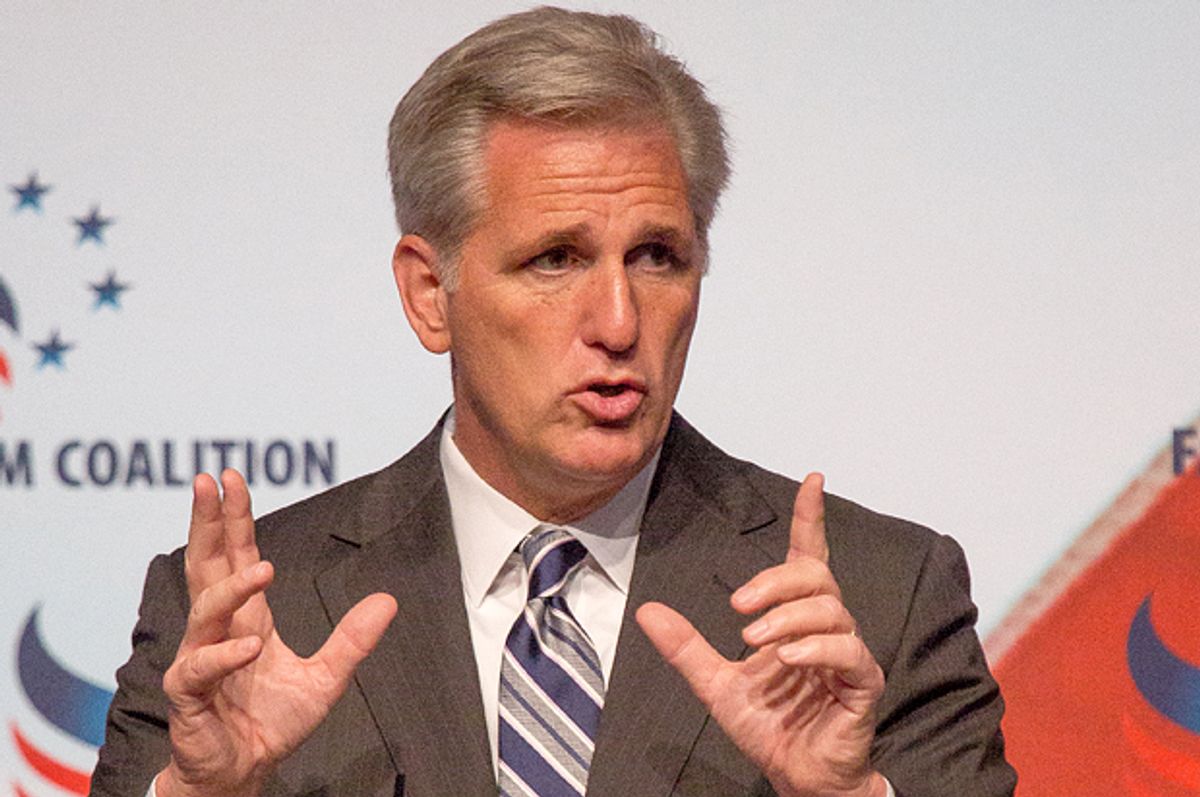January 2015 was a significant month for Republican healthcare policy. At least, the Republicans very much wanted to give the impression that, starting in January 2015, the GOP health policy machine was finally going to click into gear. For several years, all the Republicans had managed to do on the healthcare front was futilely vote time and again to repeal the Affordable Care Act as they remained utter divided on what should replace President Obama’s healthcare law. But with Congress fully in their control, the GOP started giving off the unmistakable aura of seriousness.
Speaker John Boehner went on Fox News and promised that his party would agree on an Obamacare replacement plan and that it would come up for a vote before the year was out. “There will be an alternative,” he said, “and you’re going to get to see it.” House Majority Leader Kevin McCarthy also got in on the act, announcing the creation of “a new working group” consisting of Reps. Paul Ryan, Fred Upton, and John Kline that would “continue to build on patient-centered health care solutions with which to replace Obamacare.”
In keeping with the tired conventions of official Washington, these statements and actions were directed at the “hardworking taxpayers” who were at risk from “the fallout of Obamacare.” But the real intended audience was far smaller: the five conservative justices on the Supreme Court. The high court had, at that point, already agreed to hear arguments in King v. Burwell, the case that threatens to invalidate health insurance subsidies to the majority of states. Republicans obviously wanted the court to endorse the dodgy, bad-faith arguments brought by the plaintiffs, but they also had to consider the implications of a ruling against the ACA. If the subsidies were struck down, the insurance markets in those states would descend into chaos and put people’s lives at risk, and that might give the conservative justices pause.
So, they started sending every signal they could that the Republicans in Congress would be ready to cope with the pandemonium of a ruling against the ACA. McCarthy’s statement announcing the healthcare working group said that it would “develop a contingency plan… to enact in case the Supreme Court rules in King v. Burwell that Obamacare subsidies offered on the federal exchange are illegal.” The message was perfectly clear for those inclined to listen: don’t worry, pull the trigger, we got this.
The day before oral arguments in the case began in March, the three working group members published an op-ed laying out in determinedly vague terms the principles for their Obamacare “off-ramp” proposal. After the oral arguments, the working group released a statement saying “we will be ready to act” if the court rules for the plaintiffs. That was three months ago. The court’s ruling is expected to be released very soon. So where is the “contingency plan” majority leader McCarthy said would be forthcoming back in January?
Well, apparently he’s of a different mind now over whether it’s right and proper for the House working group to weigh in before the Supreme Court has actually released its ruling. According to the Wall Street Journal:
Mr. McCarthy told reporters Monday that Republicans would be prepared regardless of what the court decides, but that they would not unveil a proposal before a ruling.
“Don’t expect us to pre-determine the Supreme Court. We have to first see what their decision is and what we have to solve,” Mr. McCarthy said. Republicans still might release outlines of their response, but not a formal bill, an aide said.
Again, McCarthy explicitly told us to expect a contingency plan. He said the working group would deliver one because he’d already pre-determined that the court would rule against the ACA. Now that ruling is nearly upon us and reporters are wondering where, exactly, the Republican plan is, McCarthy is telling them not to hold their breath, let’s not jump to conclusions, just trust that everything is under control. He and his colleagues have insisted over and over that they’ll be “ready” for the fallout of the King decision, but when pressed to demonstrate that readiness, they demur.
The reality of the situation – which McCarthy and his colleagues have worked to obscure – is that the Republicans remain as divided as ever on how to actually handle the impossibly complex task of crafting healthcare legislation. The whole exercise has been rooted in cynical politics – they’ve presented an image of legislative competence to create political conditions that would favor the abrupt crippling of a law they hate.

Shares